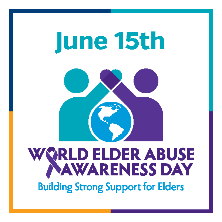DOJ Elder Justice Initiative Commemorates WEAAD with a Discussion About Federal Government Impersonation Scams
This year on World Elder Abuse Awareness Day, the Department of Justice’s Elder Justice Initiative is focusing on the scourge of federal government impersonation scams targeting older adults. In collaboration with other federal agencies, EJI has created a public outreach flyer that can be used in conjunction with scam awareness campaigns nationally.
Government impersonation scams are fraudulent schemes where perpetrators falsely claim to represent a government agency in order to deceive and exploit victims. This type of scam typically involves individuals posing as representatives from agencies such as the Internal Revenue Service (IRS), Social Security Administration (SSA), or Medicare, but scammers can pose as representatives from any federal agency. Often threats of arrest or legal action are used to motivate individuals to follow the scammer’s instructions.
How Government Impersonation Scams Typically Work: The 4 Ps
- Scammers pretend to be from a federal agency you know to gain your trust.
- Scammers say there is a problem or a prize.
- Scammers pressure you to act immediately.
Scammers tell you to pay in a specific way
Tips for consumers
- Do not pay scammers. Do not respond to, pay, or share any personal or financial information with anyone contacting you via social media, email, or otherwise offering free government services or grants.
- Do not share your personal information. The government will not message you through social media for fake prizes in exchange for personal or financial information, such as your Social Security number, date of birth, address, bank account number, login information, or copies of your personal identification.
- Do not be fooled by fake government websites that use .org, .com, or .us domains. Government websites always use a .gov domain.
- Pause and report. If you spot a scam, pause and report it to the FTC at ReportFraud.ftc.gov.
Elder Justice Professionals Can Take Action
While elder fraud is a daunting issue, there are many things elder justice professionals can do to respond to the needs of older victims.
Provide Education: Explain common tactics used in government impersonation scams. Provide examples of these scams to help them recognize warning signs.
Set the Tone: Destigmatize falling victim to scams and focus accountability on the perpetrators. Victims are often reluctant to seek help because of the shame and guilt they carry after financial losses.
Emphasize Government Procedures: Reiterate that legitimate government agencies typically do not initiate contact with individuals via unsolicited phone calls, emails, or text messages. They also do not demand immediate payment or sensitive personal information over the phone.
Encourage Verification: Advise older adults to verify the identity of anyone claiming to represent a government agency by independently looking up the official contact information for that agency and reaching out directly.
Promote Caution with Personal Information: Remind older adults to be cautious about sharing personal information, such as Social Security numbers, bank account details, or Medicare numbers, especially in response to unsolicited communications.
Encourage Reporting: Encourage older adults to report suspicious communications or suspected scams to the appropriate authorities, such as the National Elder Fraud Hotline, Adult Protective Services, or their local law enforcement agency. Assure them that reporting scams can help protect others from becoming a victim.
Offer Support and Resources: Connect victims with support services and resources available to them including AARP Elder Fraud Peer Support Groups or refer them to the National Elder Fraud Hotline (1-833-FRAUD-11 or 1-833-372-8311), local elder abuse hotlines, and community organizations that offer assistance to older adults.
Resources and Reporting
Websites
- Consumer Financial Protection Bureau. "Protecting Older Consumers."
- AARP Fraud Watch Network. "Scam Tracking Map."
- National Council on Aging. "Fraud Prevention."
- Elder Justice Initiative. "Preventing Fraud and Financial Abuse."
Public Outreach Materials
Reporting
National Fraud Hotline
- IC3
IC3 reporting video
Mission Statement
The mission of the Elder Justice Initiative is to support and coordinate the Department’s enforcement and programmatic efforts to combat elder abuse, neglect and financial fraud and scams that target our nation’s older adults.




